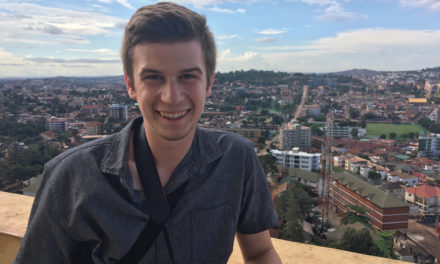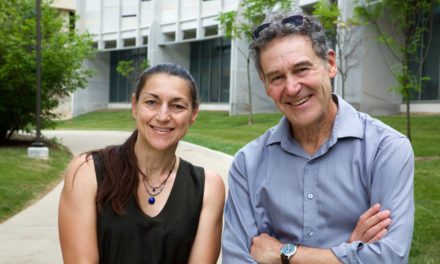
L. Jean Camp. Courtesy photo
BY PETER DORFMAN
In the October 15, 2018, issue of The New Yorker magazine, there is a nine-page, heavily researched article entitled “Enigma Machines” with the subhead, “Was there a connection between a Russian bank and the Trump campaign?” One of the experts cited in the article is L. Jean Camp, a professor in the School of Informatics and Computing at Indiana University.
During the 2016 presidential election campaign, Indiana University Professor L. Jean Camp learned that a reporter for The New Yorker was investigating a digital network traffic anomaly that, to some of her colleagues, indicated a suspicious connection between the Trump campaign and Russian interests. Camp’s specialty is online crime. An associate invited her to look at the anomaly and offer an assessment of what she thought it meant.
Camp was familiar with The New Yorker reporter, Dexter Filkins. “Dexter has done extensive war coverage,” Camp says. “When I found out he was researching network records, that was pretty surprising.”
A group of computer scientists, on their own initiative, were scanning the internet for signs that the Russian hackers who reportedly had attacked Democratic campaign computers were doing the same thing to Republicans. They were surprised to find no such evidence; instead, they found suspicious activity of a completely different kind, on a server in Pennsylvania belonging to a contractor for The Trump Organization.
“The Trump campaign outsourced most of its IT,” Camp explains. “The server they were looking at belonged to one of their outsourcing companies.” The company, Listrak, had configured the server to send out mass marketing emails, but it hadn’t been sending any.
However, computers at a handful of other companies had been trying, repeatedly, to communicate with The Trump Organization’s Listrak server. Two of those companies stood out: Alfa Bank, a large Russian financial institution with links to the Kremlin; and Spectrum Health, a Grand Rapids, Michigan, company owned by the DeVos family, who has long-standing ties to Donald Trump.
From DNS lookups, the computer scientists are not able to determine the content of the communications. Still, the server, Camp says, would only respond to certain communications from certain parties, mainly including Alfa Bank and Spectrum Health. To Camp, this was an indication that the owners were trying to mask their intent. Alfa Bank had more than 2,000 lookups, Spectrum Health, the next-greatest number, 27. However, from lookups, the computer scientists are not able to tell the content of the communications.
“We felt strongly this could be a law enforcement issue,” Camp says. “This was anomalous communication between two parties [Alfa Bank and The Trump Organization] we would not expect to be communicating. We suggested it was worth investigating whether this was a connection between the Trump campaign and Russia. I feel somewhat vindicated today.”
To Camp and her colleagues, the pattern strongly indicated the server was a covert communication channel. “Both companies clearly were trying to communicate with the Trump campaign,” she says. “But what we suggested then was nothing compared to what we’ve read since in the Cambridge Analytica and Paul Manafort indictments,” Camp says. “Those go far beyond my wildest imaginings in the fall of 2016.”
Originally trained as an electrical engineer, Camp earned a Ph.D. at Carnegie Mellon University, worked at Sandia National Laboratories, and later worked at the John F. Kennedy School of Government at Harvard University before coming to IU.
Camp says she and her colleagues were interviewed several times by reporters who seemed to assume the data scientists were pursuing a political agenda. “We told them we have no agenda,” Camp maintains. “We’re just nerds.”
The New Yorker article concludes with two quotes. The first is from a congressional staffer who says, “We’ve all looked at the data, and it doesn’t look right. But how do you get to the truth?”
The second quote, at the very end of the story, is from one of the main computer scientists who originally reported the anomaly, who says, “I hope [Special Prosecutor Robert] Mueller has all of it.”






https://www.magbloom.com/2018/11/a-nerd-iu-prof-helped-establish-a-link-between-the-trump-campaign-and-a-russian-bank-in-2016/
Now that his is all proven to be fraud and a hoax, are you going to publish an expose of the illustrious professor’s glorious deception? In light of the Durham report, this woman is probably a part of the conspiracy to spy and overthrow a duely elected president of the United States. Is that not treason?